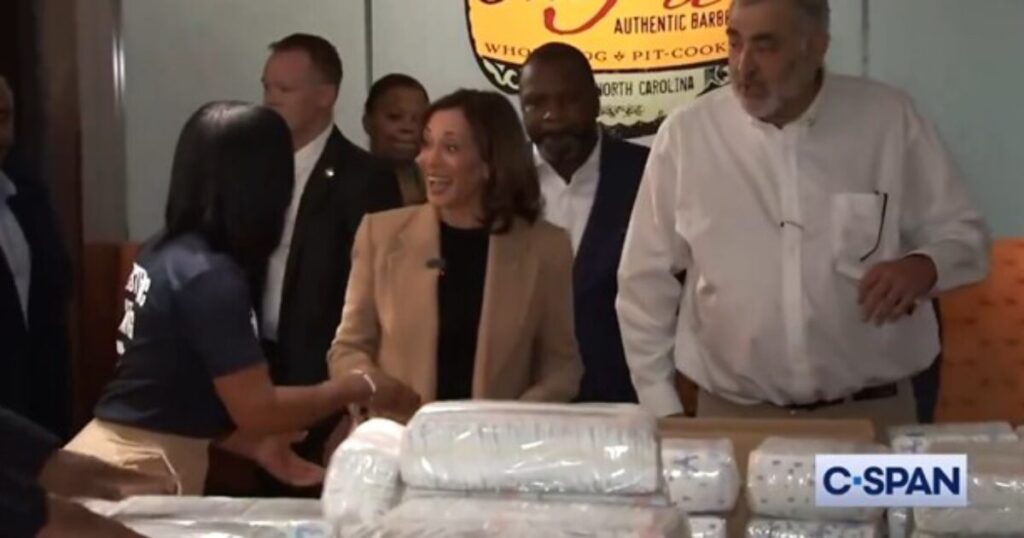Kamala Harris recently made headlines during her campaign swing in North Carolina, where she engaged in a photo-op purportedly aimed at supporting victims of Hurricane Helene. The Vice President visited the Pit Authentic Barbecue restaurant in Raleigh to assist in packing aid boxes filled with essentials such as bandages, baby formula, pain relief pills, and, notably, diapers for those affected by the disaster. While the visit was framed as a humanitarian effort, it drew skepticism from various quarters due to the political context and Harris’s recent comments, making it appear more like a staged campaign event than a genuine act of compassion.
During the aid-packaging activity, an awkward and ironic moment occurred when Harris was assigned to the “diaper detail,” a task that ignited a flurry of reactions on social media. This particular assignment quickly became fodder for satire, with the timing of her role as a diaper handler resonating with critics who have long pointed to President Biden’s age and perceived cognitive decline. In a light-hearted manner, Harris embraced her role, quipping, “Put me to work!” and jokingly referring to herself as part of the “cleanup crew.” However, many critics saw this as a glaring contradiction, perceiving her smile and jokes as unreflective of the serious situation facing the hurricane victims.
Conservative social media users were quick to respond to this incident, directing their jabs at Harris and the current administration. Various memes and comments flooded platforms such as Twitter, where critics humorously suggested that her participation in the diaper detail was emblematic of her broader political career—a career they argued has included a significant amount of backtracking and opportunism. Remarks ranged from pointing out that, for some, handling diapers was an apt metaphor for what they perceived as Harris’s role in cleaning up after political missteps, particularly those attributed to Biden’s administration.
The incident also spurred discussions about Harris’s political trajectory, with some commentators linking her past relationships and political alliances to her current circumstances. Jokes about her previous connections, including her relationship with former San Francisco Mayor Willie Brown, were prevalent, suggesting that her experiences informed her current public persona. This commentary further highlighted the pitfalls of her political journey, painting her as someone who has navigated complex social and political terrains, often at the expense of genuine public service acknowledgment.
Despite the humorous critique, the underlying tone of the discourse reflects a serious concern among detractors about Harris’s ability to connect with real issues affecting constituents. Many observers believed that the photo-op, rather than genuinely addressing the needs of hurricane victims, served more as a method of political posturing. Critics noted that the visit lacked substance, particularly in terms of actionable outreach to the communities impacted by the disaster, prompting calls for genuine engagement rather than mere public relations tactics.
In conclusion, while Kamala Harris’s diaper detail photo-op may have been intended as a show of solidarity with hurricane victims, it inadvertently exposed the disconnect between political messaging and the realities of governance. The event underscored ongoing criticisms regarding the current administration’s ability to manage crises effectively and the perception that certain political figures prioritize media spectacles over substantive humanitarian efforts. Ultimately, this incident serves as a reminder of the complexities and challenges that come with being a high-profile political figure in a polarized environment, where every action can be scrutinized and contextualized within larger narratives of competence and accountability.

